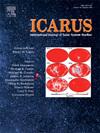Adaptive sampling with PIXL on the Mars Perseverance rover
IF 2.5
2区 物理与天体物理
Q2 ASTRONOMY & ASTROPHYSICS
引用次数: 0
Abstract
Planetary rovers can use onboard data analysis to adapt their measurement plan on the fly, improving the science value of data collected between commands from Earth. This paper describes the implementation of an adaptive sampling algorithm used by PIXL, the X-ray fluorescence spectrometer of the Mars 2020 Perseverance rover. PIXL is deployed using the rover arm to measure X-ray spectra of rocks with a scan density of several thousand points over an area of typically 5 × 7 mm. The adaptive sampling algorithm is programmed to recognize points of interest and to increase the signal-to-noise ratio at those locations by performing longer integrations. Two approaches are used to formulate the sampling rules based on past quantification data: (1) Expressions that isolate particular regions within a ternary compositional diagram, and (2) Machine learning rules that threshold for a high weight percent of particular compounds. The design of the rulesets are outlined and the performance of the algorithm is quantified using measurements from the surface of Mars. To our knowledge, PIXL’s adaptive sampling represents the first autonomous decision-making based on real-time compositional analysis by a spacecraft on the surface of another planet.
求助全文
约1分钟内获得全文
求助全文
来源期刊

Icarus
地学天文-天文与天体物理
CiteScore
6.30
自引率
18.80%
发文量
356
审稿时长
2-4 weeks
期刊介绍:
Icarus is devoted to the publication of original contributions in the field of Solar System studies. Manuscripts reporting the results of new research - observational, experimental, or theoretical - concerning the astronomy, geology, meteorology, physics, chemistry, biology, and other scientific aspects of our Solar System or extrasolar systems are welcome. The journal generally does not publish papers devoted exclusively to the Sun, the Earth, celestial mechanics, meteoritics, or astrophysics. Icarus does not publish papers that provide "improved" versions of Bode''s law, or other numerical relations, without a sound physical basis. Icarus does not publish meeting announcements or general notices. Reviews, historical papers, and manuscripts describing spacecraft instrumentation may be considered, but only with prior approval of the editor. An entire issue of the journal is occasionally devoted to a single subject, usually arising from a conference on the same topic. The language of publication is English. American or British usage is accepted, but not a mixture of these.
 求助内容:
求助内容: 应助结果提醒方式:
应助结果提醒方式:


